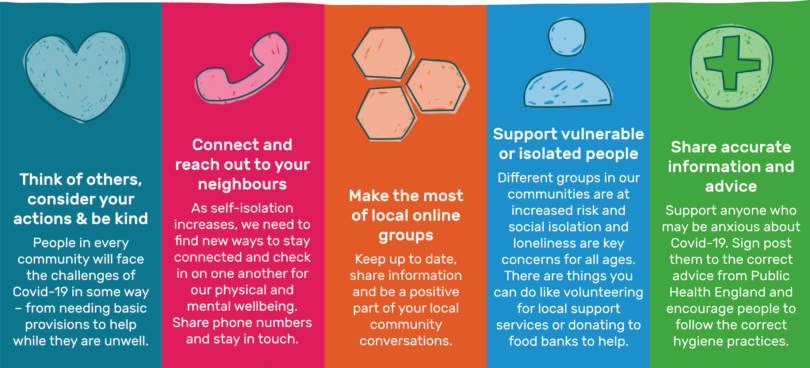In the wake of the £30 billion emergency fund announced in the Budget yesterday and anticipated switch to the delay phase of the Government four-part plan, we have teamed up with our friends to launch the Community Action Response to encourage everyone to do what they can to support their neighbours and particularly vulnerable and isolated people during Coronavirus (Covid-19) pandemic.
Launched by the Eden Project Communities, Nextdoor has joined the cause along with The National Lottery Community Fund, Neighbourhood Watch, Campaign to End Loneliness and Eco Attractions Group, the Community Action Response has been created because of the unprecedented challenge that Coronavirus presents for people in every neighbourhood in the UK. Together we are calling for everyone to take steps that will help communities cope when the worst impacts of the virus hit.
Community Action Response – five things you can do:
- Think of others, consider your actions & be kind: People in every community will face the challenges of Covid-19 in some way – from needing basic provisions to help while they are unwell.
- Connect and reach out to your neighbours: as self-isolation increases, we need to find new ways to stay connected and check in on one another for our physical and mental wellbeing. Share phone numbers and stay in touch.
- Make the most of local online groups: Keep up to date, share information and be a positive part of your local community conversations using platforms like Nextdoor.
- Support vulnerable or isolated people: different groups in our communities are at increased risk and social isolation and loneliness are key concerns for all ages. There are things you can do like volunteering for local support services or donating to food banks to help.
- Share accurate information and advice: Support anyone who may be anxious about Covid-19. Sign post them to the correct advice from Public Health England and encourage people to follow the correct hygiene practices.
Research from The Big Lunch shows nearly a fifth of us in the UK have no-one in our neighbourhoods outside the immediate family we could call on if we needed help or support. With the rapid spread of Coronavirus (Covid-19) increasingly likely, this is a real risk and combined with the need to self-isolate this gap in our community connections needs to be closed. The research also reported that more than 36 million people feel distant or very distant from their neighbours, yet three-quarters of us believe it would be better for our communities if we were closer to them.
Nick Lisher, Head of EMEA, Nextdoor, said: “Neighbourhoods, can be an essential source of support, information and help in challenging times. At Nextdoor, we see first-hand what’s possible when communities work together. Let’s use our resources collectively to help those who are vulnerable or isolated in this time of need. It’s time for us all to create a neighbourhood we can rely on.”
Bringing people together to advocate for community action, Peter Stewart – Executive Director of the Eden Project said: “Through our work with communities UK wide we see the difference that people working together can have. Neighbourly support can make a huge difference in a world fraught with challenge. The current threat is set to impact all of us in one form or another, and stronger local connections within communities are vital to see this crisis out. That’s why we’ve joined forces with our friends and partners to call on people everywhere to take positive action to support and care for each other in the coming weeks and months.”
Kate Shurety, Executive Director of the Campaign to End Loneliness said: “For many people there will be a tough, but necessary period of social isolation. Many of us will miss family and friends and taking part in our hobbies, interests and activities. It shows how important friendship and connection are in our lives, and how difficult it can be when they’re missing. This reminds us that for too many people their lives are often quite a lot like this. Research shows that half a million older people regularly experience these kinds of protracted periods of isolation, going at least five or six days a week without seeing or speaking to anyone at all.”





